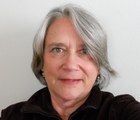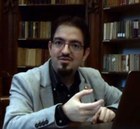Visiting fellows
External researchers at /DH.arc

Barbara Bordalejo
Professor of English & Digital Humanities
Barabara is a textual critic, editor, and digital humanist with a background in English literature. She edited texts, mostly Chaucer's Canterbury Tales, but also Darwin's Origin of Species.
Barbara was at FICLIT between March and May 2018. During her stay she gave 3 seminars for DHDK students and PhD students in DH.
Seminars
- May 8th, The Implications of Editorial Theory in Textual Encoding for Scholarly Purposes
This talk is aimed at scholars interested in textual encoding working with original document materials (authorial or non-authorial) and describes the theoretical framework based on a distinction between the text of the document and the variant states of the text.
- May 15th, The Past and Future of Digital Editions
This talk focuses on the development of digital editions since the 1990s to the present day. Dr. Bordalejo will demonstrate what has changed in the way digital editions are produced and presented. With examples from the Canterbury Tales, the Commedia and The Origin of Species (as well as other projects), she will show the changes in tools, as well as in presentation.
- May 22nd, Textual Communities Demonstration
Textual Communities is an online integrated site for the creation of transcriptions and collation and the production of digital editions. The Textual Communities framework offers users who wish to produce TEI compliant transcriptions a relatively simple tool to use for the creation of digital editions. This session will introduce Textual Communities and discuss its use and potential.

Karen Coyle
Librarian & Information Scientist
Karen Coyle is a librarian with nearly four decades of experience with library technology. She engages in a variety of areas relating to digital libraries. Karen has published dozens of articles and reports, most available on her web site, kcoyle.net.
Karen was at FICLIT between April and May 2019. During her stay she gave 3 seminars for DHDK students and a keynote speech for our group and PhD students.
Seminars
- Friday 3rd May, Organizing our Knowledge: from Ancient Times to Today – Describing knowledge organization techniques from early to modern times
- Friday 10th May, Libraries and their catalogs: from scarcity to over-abundance – The goals of the library catalog and the need to revisit these foals for the “computer age”.
- Tuesday 21st May, Things, Strings and Pitfalls: Thinking Linking – Looking at the most common current metadtaa standard (Resource Description Format), emphasizing how the abstract model and semantics of this model differ from past computing styles.
DHARC Keynote
Thursday, 23 May: “Expanding the FRBR Model Beyond Libraries”.
From Karen talk: "Leaning on the work of professors Peroni, Vitali and Tomasi in their use of FRBR concepts for such diverse communities as digital humanities, academic citations, fast-fashion industry, and legal documentation, I proposed a new set of primary FRBR entities that could serve to unify the metadata created in these highly disparate environments. The situation today is that each of these environments operates in its own data silo and they are not able to take advantage of similarities in their approaches. Each community must redefine the FRBR entities in its own namespace, and few are aware of the work of others".

FABIO CUSIMANO
PhD in Storia del Cristianesimo medievale e specialista in Storia del libro e Digital Humanities
Fabio Cusimano (Palermo, 1980), PhD in “Storia del Cristianesimo medievale”, è specializzato in Storia del libro e in Digital Humanities.
Attualmente è Responsabile della Catalogazione e del Digital Asset Management (D.A.M.) presso la Veneranda Biblioteca Ambrosiana di Milano, dove è a capo ‒ in collaborazione con la University of Notre Dame (Indiana, USA) e l’Università Cattolica del Sacro Cuore di Milano ‒ della progettazione, dello sviluppo e della gestione della Digital Library ad accesso aperto della Veneranda Biblioteca Ambrosiana.
Fabio ha tenuto un seminario per i PDH in DH su IIIF nel giugno 2021.
References:

Desmond Schmidt
Textual scholar and Digital Humanist
Desmond Schmidt worked at the Information Security Institute, Queensland University of Technology, as a software engineer. Since 2002 he has worked with Domenico Fiormonte and the Digital Variants team developing tools for viewing and editing multi-version texts. He has previously worked on an edition of Wittgenstein (the Vienna Edition), and is currently involved in a number of other editorial projects. He recently completed a second PhD entitled "Multiple Versions and Overlap in Digital Text," at the University of Queensland's IT Department, having completed a previous PhD in classical Greek papyrology at the University of Cambridge, UK, in 1987.
Desmond was (remote) visiting at FICLIT between September and November 2020. During his stay, he gave 10 lessons in the Seminars activity within DHDK.

Giovanni Colavizza
Assistant Professor in Digital Humanities
Giovanni is an assistant professor at the University of Amsterdam (NL), a visiting researcher at The Alan Turing Institute (UK) and at the Centre for Science and Technology Studies (CWTS), Leiden University (NL). His current research focuses ranges from using data to study cultural and social phenomena, including the human past and art markets, to science communication and Wikipedia. In particular, Colavizza specialises in the use of Artificial Intelligence for Cultural Heritage and GLAM.
Giovanni was at FICLIT between October and December 2021. During his stay he taught Semantic Digital Libraries for DHDK students and gave a seminar on "Crypto art" for PhD students in DH.